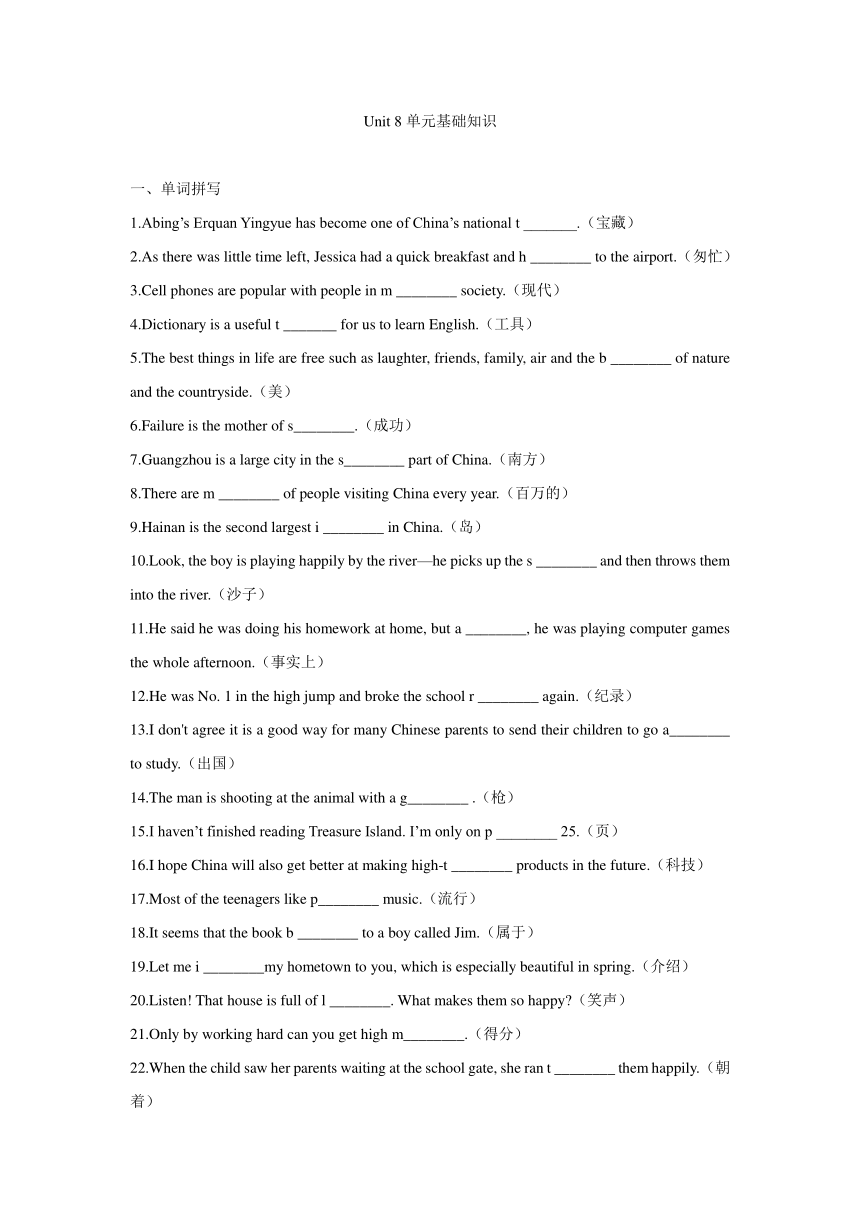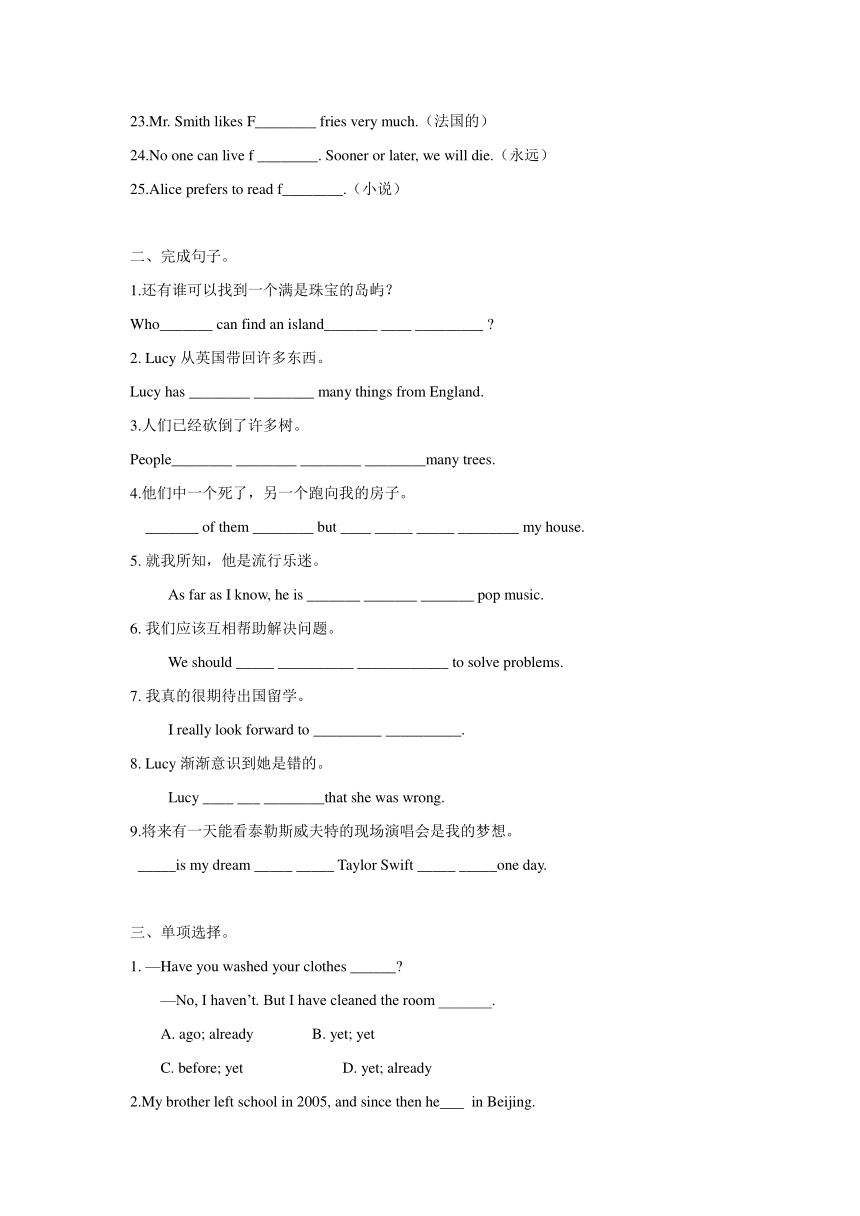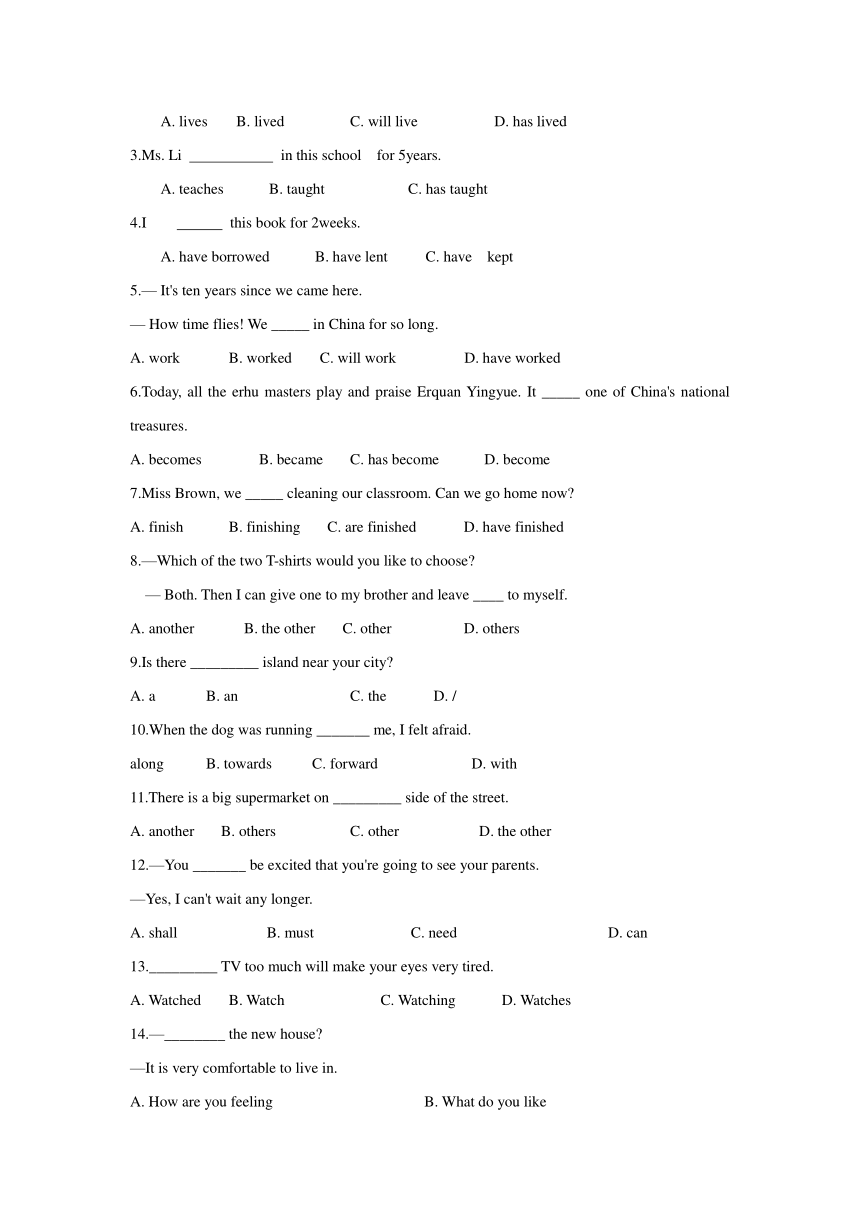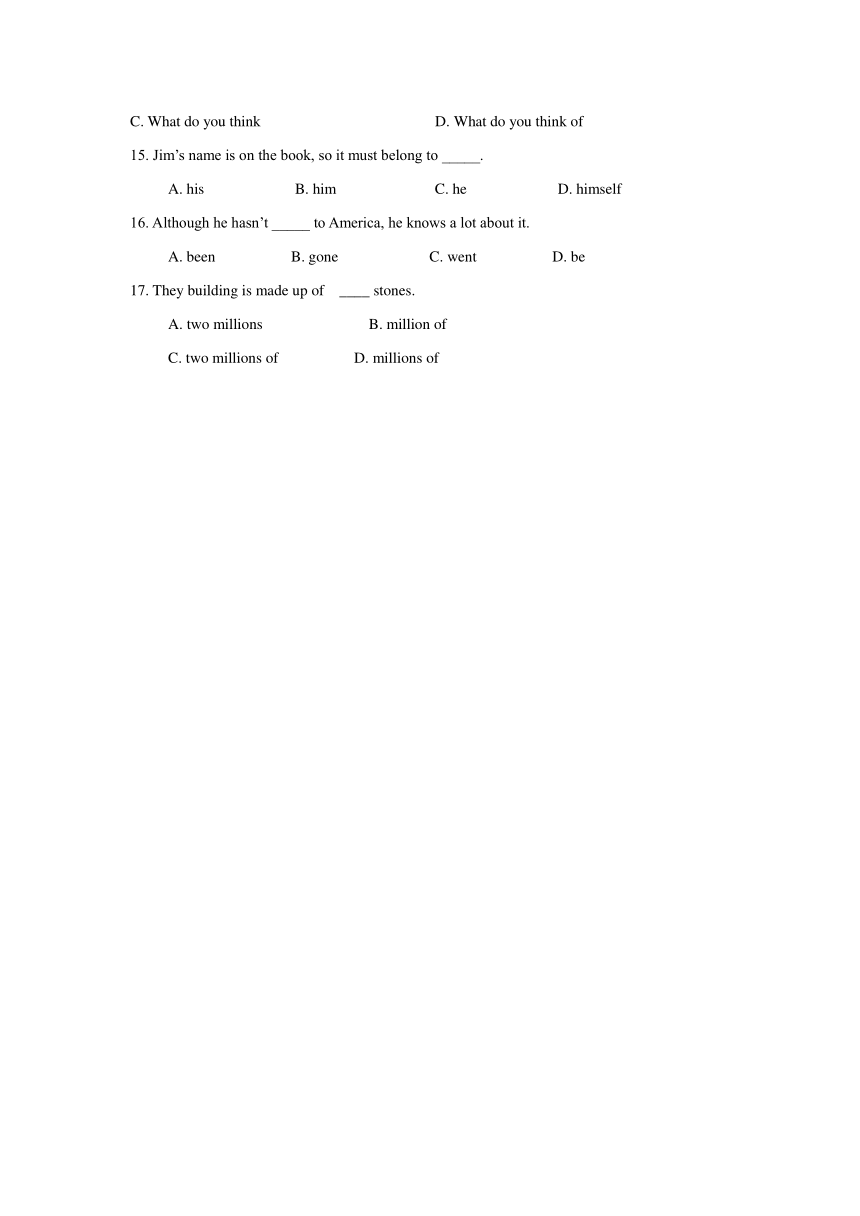Unit 8 Have you read Treasure Island yet单元基础检测(含解析)人教版英语八年级下册
文档属性
| 名称 | Unit 8 Have you read Treasure Island yet单元基础检测(含解析)人教版英语八年级下册 |  | |
| 格式 | docx | ||
| 文件大小 | 30.0KB | ||
| 资源类型 | 教案 | ||
| 版本资源 | 人教新目标(Go for it)版 | ||
| 科目 | 英语 | ||
| 更新时间 | 2025-02-26 14:48:53 | ||
图片预览




文档简介
Unit 8单元基础知识
一、单词拼写
1.Abing’s Erquan Yingyue has become one of China’s national t _______.(宝藏)
2.As there was little time left, Jessica had a quick breakfast and h ________ to the airport.(匆忙)
3.Cell phones are popular with people in m ________ society.(现代)
4.Dictionary is a useful t _______ for us to learn English.(工具)
5.The best things in life are free such as laughter, friends, family, air and the b ________ of nature and the countryside.(美)
6.Failure is the mother of s________.(成功)
7.Guangzhou is a large city in the s________ part of China.(南方)
8.There are m ________ of people visiting China every year.(百万的)
9.Hainan is the second largest i ________ in China.(岛)
10.Look, the boy is playing happily by the river—he picks up the s ________ and then throws them into the river.(沙子)
11.He said he was doing his homework at home, but a ________, he was playing computer games the whole afternoon.(事实上)
12.He was No. 1 in the high jump and broke the school r ________ again.(纪录)
13.I don't agree it is a good way for many Chinese parents to send their children to go a________ to study.(出国)
14.The man is shooting at the animal with a g________ .(枪)
15.I haven’t finished reading Treasure Island. I’m only on p ________ 25.(页)
16.I hope China will also get better at making high-t ________ products in the future.(科技)
17.Most of the teenagers like p________ music.(流行)
18.It seems that the book b ________ to a boy called Jim.(属于)
19.Let me i ________my hometown to you, which is especially beautiful in spring.(介绍)
20.Listen! That house is full of l ________. What makes them so happy (笑声)
21.Only by working hard can you get high m________.(得分)
22.When the child saw her parents waiting at the school gate, she ran t ________ them happily.(朝着)
23.Mr. Smith likes F________ fries very much.(法国的)
24.No one can live f ________. Sooner or later, we will die.(永远)
25.Alice prefers to read f________.(小说)
二、完成句子。
1.还有谁可以找到一个满是珠宝的岛屿?
Who_______ can find an island_______ ____ _________
2. Lucy从英国带回许多东西。
Lucy has ________ ________ many things from England.
3.人们已经砍倒了许多树。
People________ ________ ________ ________many trees.
4.他们中一个死了,另一个跑向我的房子。
_______ of them ________ but ____ _____ _____ ________ my house.
5. 就我所知,他是流行乐迷。
As far as I know, he is _______ _______ _______ pop music.
6. 我们应该互相帮助解决问题。
We should _____ __________ ____________ to solve problems.
7. 我真的很期待出国留学。
I really look forward to _________ __________.
8. Lucy渐渐意识到她是错的。
Lucy ____ ___ ________that she was wrong.
9.将来有一天能看泰勒斯威夫特的现场演唱会是我的梦想。
_____is my dream _____ _____ Taylor Swift _____ _____one day.
三、单项选择。
1. —Have you washed your clothes ______
—No, I haven’t. But I have cleaned the room _______.
A. ago; already B. yet; yet
C. before; yet D. yet; already
2.My brother left school in 2005, and since then he in Beijing.
A. lives B. lived C. will live D. has lived
3.Ms. Li in this school for 5years.
A. teaches B. taught C. has taught
4.I this book for 2weeks.
A. have borrowed B. have lent C. have kept
5.— It's ten years since we came here.
— How time flies! We _____ in China for so long.
A. work B. worked C. will work D. have worked
6.Today, all the erhu masters play and praise Erquan Yingyue. It _____ one of China's national treasures.
A. becomes B. became C. has become D. become
7.Miss Brown, we _____ cleaning our classroom. Can we go home now
A. finish B. finishing C. are finished D. have finished
8.—Which of the two T-shirts would you like to choose
— Both. Then I can give one to my brother and leave ____ to myself.
A. another B. the other C. other D. others
9.Is there _________ island near your city
A. a B. an C. the D. /
10.When the dog was running _______ me, I felt afraid.
along B. towards C. forward D. with
11.There is a big supermarket on _________ side of the street.
A. another B. others C. other D. the other
12.—You _______ be excited that you're going to see your parents.
—Yes, I can't wait any longer.
A. shall B. must C. need D. can
13._________ TV too much will make your eyes very tired.
A. Watched B. Watch C. Watching D. Watches
14.—________ the new house
—It is very comfortable to live in.
A. How are you feeling B. What do you like
C. What do you think D. What do you think of
15. Jim’s name is on the book, so it must belong to _____.
A. his B. him C. he D. himself
16. Although he hasn’t _____ to America, he knows a lot about it.
A. been B. gone C. went D. be
17. They building is made up of ____ stones.
A. two millions B. million of
C. two millions of D. millions of
一、单词拼写
1. treasures
o 解析:“one of + 名词复数” 表示 “…… 之一”,“宝藏” 是 “treasure”,这里要用复数形式 “treasures”。
2. hurried
o 解析:“and” 连接两个并列的动作,“had” 是过去式,所以 “匆忙” 这个动作也用过去式,“匆忙” 是 “hurry”,其过去式是 “hurried”。
3. modern
o 解析:“现代社会” 用 “modern society”,“modern” 是形容词,修饰名词 “society”。
4. tool
o 解析:“a” 后面接可数名词单数,“工具” 是 “tool”。
5. beauty
o 解析:“the” 后面接名词,“美” 是 “beauty”,“the beauty of nature and the countryside” 表示 “自然和乡村之美”。
6. success
o 解析:“of” 后面接名词,“成功” 是 “success”,“Failure is the mother of success.” 是谚语,意为 “失败是成功之母”。
7. southern
o 解析:“part” 是名词,前面用形容词修饰,“南方” 的形容词是 “southern”,“in the southern part of China” 表示 “在中国的南部”。
8. millions
o 解析:“millions of” 表示 “数以百万计的”,是固定短语。
9. island
o 解析:“the second largest” 后面接可数名词单数,“岛” 是 “island”。
10. sand
o 解析:“沙子” 是不可数名词,用 “sand”。
11. actually
o 解析:“事实上” 是 “actually”,在句中作状语。
12. record
o 解析:“打破学校纪录” 是 “break the school record”,“record” 是可数名词,这里用单数。
13. abroad
o 解析:“go abroad” 表示 “出国”,是固定短语。
14. gun
o 解析:“a” 后面接可数名词单数,“枪” 是 “gun”。
15. page
o 解析:“在第…… 页” 用 “on page + 数字”,所以这里填 “page”。
16. technology
o 解析:“high - technology products” 表示 “高科技产品”,“technology” 是名词。
17. pop
o 解析:“pop music” 表示 “流行音乐”,是固定表达。
18. belongs
o 解析:“seem that” 引导的从句中,“the book” 是第三人称单数,一般现在时中动词用第三人称单数形式,“属于” 是 “belong”,其第三人称单数是 “belongs”。
19. introduce
o 解析:“let sb. do sth.” 表示 “让某人做某事”,“介绍” 是 “introduce”。
20. laughter
o 解析:“be full of” 后面接名词,“笑声” 是 “laughter”,是不可数名词。
21. marks
o 解析:“get high marks” 表示 “取得高分”,“mark” 是可数名词,这里用复数形式 “marks”。
22. towards
o 解析:“run towards” 表示 “朝着…… 跑去”,所以填 “towards”。
23. French
o 解析:“French fries” 表示 “薯条”,“French” 是形容词,修饰 “fries”。
24. forever
o 解析:“永远” 是 “forever”,在句中作状语。
25. fiction
o 解析:“read fiction” 表示 “读小说”,“fiction” 在这里是不可数名词。
二、完成句子
1. else; full of jewels
o 解析:“还有谁” 用 “who else”;“满是…… 的” 是 “full of...”,“珠宝” 是 “jewels”。
2. brought back
o 解析:“带回” 是 “bring back”,“has” 表明句子是现在完成时,“bring” 的过去分词是 “brought”。
3. have cut down
o 解析:“砍倒” 是 “cut down”,“已经” 表示动作对现在造成的影响,用现在完成时,结构是 “have/has + 过去分词”,“people” 是复数,“have” 不变,“cut” 的过去分词还是 “cut”。
4. One; died; the other ran towards
o 解析:“one...the other...” 表示 “一个…… 另一个……”;“死” 是 “die”,根据语境用过去式 “died”;“跑向” 是 “run towards”,“run” 的过去式是 “ran”。
5. a fan of
o 解析:“a fan of...” 表示 “…… 的粉丝”。
6. help each other
o 解析:“互相帮助” 是 “help each other”。
7. studying abroad
o 解析:“look forward to doing sth.” 表示 “期待做某事”,“出国留学” 是 “study abroad”,所以用 “studying abroad”。
8. came to realize
o 解析:“渐渐意识到” 是 “come to realize”,根据语境用过去式,“come” 的过去式是 “came”。
9. It; to watch; live in concert
o 解析:“It is one's dream to do sth.” 是固定句型,“It” 作形式主语,真正的主语是后面的动词不定式;“看…… 的现场演唱会” 是 “watch...live in concert”。
三、单项选择
1. D
o 解析:“yet” 常用于否定句和疑问句,置于句末;“already” 常用于肯定句,置于句中或句末。第一个空是疑问句,用 “yet”;第二个空是肯定句,用 “already”,所以选 D。
2. D
o 解析:“since then” 表示 “从那时起”,是现在完成时的标志,结构是 “have/has + 过去分词”,“he” 是第三人称单数,用 “has lived”,所以选 D。
3. C
o 解析:“for 5 years” 表示一段时间,是现在完成时的标志,“Ms. Li” 是第三人称单数,用 “has taught”,所以选 C。
4. C
o 解析:“borrow” 和 “lend” 都是短暂性动词,不能和 “for 2 weeks” 这样的时间段连用,“keep” 是延续性动词,可以和时间段连用,所以选 C。
5. D
o 解析:“for so long” 表示一段时间,用现在完成时,“We” 是复数,用 “have worked”,所以选 D。
6. C
o 解析:根据语境,《二泉映月》成为中国国宝是从过去到现在的一个过程,对现在有影响,用现在完成时,“It” 是第三人称单数,用 “has become”,所以选 C。
7. D
o 解析:根据 “Can we go home now ” 可知,打扫教室这个动作已经完成,用现在完成时,“We” 是复数,用 “have finished”,所以选 D。
8. B
o 解析:“两者中的另一个” 用 “the other”;“another” 表示三者或三者以上中的另一个;“other” 表示其他的,后接可数名词复数;“others” 表示其他的人或物。这里是两者中的另一个,选 B。
9. B
o 解析:“island” 是以元音音素开头的单词,“一个岛屿” 用 “an island”,所以选 B。
10. B
o 解析:“run towards” 表示 “朝着…… 跑去”;“along” 表示 “沿着”;“forward” 表示 “向前”;“with” 表示 “和…… 一起”。这里说狗朝 “我” 跑来,选 B。
11. D
o 解析:街道有两边,“两者中的另一个” 用 “the other”,所以选 D。
12. B
o 解析:“must” 表示推测,意为 “一定”,根据 “you're going to see your parents” 可知,推测对方一定很激动,选 B。
13. C
o 解析:“动词原形不能作主语”,这里用动名词 “Watching” 作主语,所以选 C。
14. D
o 解析:“What do you think of... ” 表示 “你认为…… 怎么样?”,用来询问对方对某事或某物的看法,所以选 D。
15. B
o 解析:“belong to” 后面接人称代词宾格,“him” 是 “he” 的宾格,所以选 B。
16. A
o 解析:“have/has been to” 表示 “去过某地(已经回来)”;“have/has gone to” 表示 “去了某地(还未回来)”。根据 “he knows a lot about it” 可知,他去过美国已经回来了,用 “has been to”,所以选 A。
17. D
o 解析:“million” 前面有具体数字时,用 “数字 + million”,后面不能加 “s” 和 “of”;“millions of” 表示 “数以百万计的”。所以选 D。
一、单词拼写
1.Abing’s Erquan Yingyue has become one of China’s national t _______.(宝藏)
2.As there was little time left, Jessica had a quick breakfast and h ________ to the airport.(匆忙)
3.Cell phones are popular with people in m ________ society.(现代)
4.Dictionary is a useful t _______ for us to learn English.(工具)
5.The best things in life are free such as laughter, friends, family, air and the b ________ of nature and the countryside.(美)
6.Failure is the mother of s________.(成功)
7.Guangzhou is a large city in the s________ part of China.(南方)
8.There are m ________ of people visiting China every year.(百万的)
9.Hainan is the second largest i ________ in China.(岛)
10.Look, the boy is playing happily by the river—he picks up the s ________ and then throws them into the river.(沙子)
11.He said he was doing his homework at home, but a ________, he was playing computer games the whole afternoon.(事实上)
12.He was No. 1 in the high jump and broke the school r ________ again.(纪录)
13.I don't agree it is a good way for many Chinese parents to send their children to go a________ to study.(出国)
14.The man is shooting at the animal with a g________ .(枪)
15.I haven’t finished reading Treasure Island. I’m only on p ________ 25.(页)
16.I hope China will also get better at making high-t ________ products in the future.(科技)
17.Most of the teenagers like p________ music.(流行)
18.It seems that the book b ________ to a boy called Jim.(属于)
19.Let me i ________my hometown to you, which is especially beautiful in spring.(介绍)
20.Listen! That house is full of l ________. What makes them so happy (笑声)
21.Only by working hard can you get high m________.(得分)
22.When the child saw her parents waiting at the school gate, she ran t ________ them happily.(朝着)
23.Mr. Smith likes F________ fries very much.(法国的)
24.No one can live f ________. Sooner or later, we will die.(永远)
25.Alice prefers to read f________.(小说)
二、完成句子。
1.还有谁可以找到一个满是珠宝的岛屿?
Who_______ can find an island_______ ____ _________
2. Lucy从英国带回许多东西。
Lucy has ________ ________ many things from England.
3.人们已经砍倒了许多树。
People________ ________ ________ ________many trees.
4.他们中一个死了,另一个跑向我的房子。
_______ of them ________ but ____ _____ _____ ________ my house.
5. 就我所知,他是流行乐迷。
As far as I know, he is _______ _______ _______ pop music.
6. 我们应该互相帮助解决问题。
We should _____ __________ ____________ to solve problems.
7. 我真的很期待出国留学。
I really look forward to _________ __________.
8. Lucy渐渐意识到她是错的。
Lucy ____ ___ ________that she was wrong.
9.将来有一天能看泰勒斯威夫特的现场演唱会是我的梦想。
_____is my dream _____ _____ Taylor Swift _____ _____one day.
三、单项选择。
1. —Have you washed your clothes ______
—No, I haven’t. But I have cleaned the room _______.
A. ago; already B. yet; yet
C. before; yet D. yet; already
2.My brother left school in 2005, and since then he in Beijing.
A. lives B. lived C. will live D. has lived
3.Ms. Li in this school for 5years.
A. teaches B. taught C. has taught
4.I this book for 2weeks.
A. have borrowed B. have lent C. have kept
5.— It's ten years since we came here.
— How time flies! We _____ in China for so long.
A. work B. worked C. will work D. have worked
6.Today, all the erhu masters play and praise Erquan Yingyue. It _____ one of China's national treasures.
A. becomes B. became C. has become D. become
7.Miss Brown, we _____ cleaning our classroom. Can we go home now
A. finish B. finishing C. are finished D. have finished
8.—Which of the two T-shirts would you like to choose
— Both. Then I can give one to my brother and leave ____ to myself.
A. another B. the other C. other D. others
9.Is there _________ island near your city
A. a B. an C. the D. /
10.When the dog was running _______ me, I felt afraid.
along B. towards C. forward D. with
11.There is a big supermarket on _________ side of the street.
A. another B. others C. other D. the other
12.—You _______ be excited that you're going to see your parents.
—Yes, I can't wait any longer.
A. shall B. must C. need D. can
13._________ TV too much will make your eyes very tired.
A. Watched B. Watch C. Watching D. Watches
14.—________ the new house
—It is very comfortable to live in.
A. How are you feeling B. What do you like
C. What do you think D. What do you think of
15. Jim’s name is on the book, so it must belong to _____.
A. his B. him C. he D. himself
16. Although he hasn’t _____ to America, he knows a lot about it.
A. been B. gone C. went D. be
17. They building is made up of ____ stones.
A. two millions B. million of
C. two millions of D. millions of
一、单词拼写
1. treasures
o 解析:“one of + 名词复数” 表示 “…… 之一”,“宝藏” 是 “treasure”,这里要用复数形式 “treasures”。
2. hurried
o 解析:“and” 连接两个并列的动作,“had” 是过去式,所以 “匆忙” 这个动作也用过去式,“匆忙” 是 “hurry”,其过去式是 “hurried”。
3. modern
o 解析:“现代社会” 用 “modern society”,“modern” 是形容词,修饰名词 “society”。
4. tool
o 解析:“a” 后面接可数名词单数,“工具” 是 “tool”。
5. beauty
o 解析:“the” 后面接名词,“美” 是 “beauty”,“the beauty of nature and the countryside” 表示 “自然和乡村之美”。
6. success
o 解析:“of” 后面接名词,“成功” 是 “success”,“Failure is the mother of success.” 是谚语,意为 “失败是成功之母”。
7. southern
o 解析:“part” 是名词,前面用形容词修饰,“南方” 的形容词是 “southern”,“in the southern part of China” 表示 “在中国的南部”。
8. millions
o 解析:“millions of” 表示 “数以百万计的”,是固定短语。
9. island
o 解析:“the second largest” 后面接可数名词单数,“岛” 是 “island”。
10. sand
o 解析:“沙子” 是不可数名词,用 “sand”。
11. actually
o 解析:“事实上” 是 “actually”,在句中作状语。
12. record
o 解析:“打破学校纪录” 是 “break the school record”,“record” 是可数名词,这里用单数。
13. abroad
o 解析:“go abroad” 表示 “出国”,是固定短语。
14. gun
o 解析:“a” 后面接可数名词单数,“枪” 是 “gun”。
15. page
o 解析:“在第…… 页” 用 “on page + 数字”,所以这里填 “page”。
16. technology
o 解析:“high - technology products” 表示 “高科技产品”,“technology” 是名词。
17. pop
o 解析:“pop music” 表示 “流行音乐”,是固定表达。
18. belongs
o 解析:“seem that” 引导的从句中,“the book” 是第三人称单数,一般现在时中动词用第三人称单数形式,“属于” 是 “belong”,其第三人称单数是 “belongs”。
19. introduce
o 解析:“let sb. do sth.” 表示 “让某人做某事”,“介绍” 是 “introduce”。
20. laughter
o 解析:“be full of” 后面接名词,“笑声” 是 “laughter”,是不可数名词。
21. marks
o 解析:“get high marks” 表示 “取得高分”,“mark” 是可数名词,这里用复数形式 “marks”。
22. towards
o 解析:“run towards” 表示 “朝着…… 跑去”,所以填 “towards”。
23. French
o 解析:“French fries” 表示 “薯条”,“French” 是形容词,修饰 “fries”。
24. forever
o 解析:“永远” 是 “forever”,在句中作状语。
25. fiction
o 解析:“read fiction” 表示 “读小说”,“fiction” 在这里是不可数名词。
二、完成句子
1. else; full of jewels
o 解析:“还有谁” 用 “who else”;“满是…… 的” 是 “full of...”,“珠宝” 是 “jewels”。
2. brought back
o 解析:“带回” 是 “bring back”,“has” 表明句子是现在完成时,“bring” 的过去分词是 “brought”。
3. have cut down
o 解析:“砍倒” 是 “cut down”,“已经” 表示动作对现在造成的影响,用现在完成时,结构是 “have/has + 过去分词”,“people” 是复数,“have” 不变,“cut” 的过去分词还是 “cut”。
4. One; died; the other ran towards
o 解析:“one...the other...” 表示 “一个…… 另一个……”;“死” 是 “die”,根据语境用过去式 “died”;“跑向” 是 “run towards”,“run” 的过去式是 “ran”。
5. a fan of
o 解析:“a fan of...” 表示 “…… 的粉丝”。
6. help each other
o 解析:“互相帮助” 是 “help each other”。
7. studying abroad
o 解析:“look forward to doing sth.” 表示 “期待做某事”,“出国留学” 是 “study abroad”,所以用 “studying abroad”。
8. came to realize
o 解析:“渐渐意识到” 是 “come to realize”,根据语境用过去式,“come” 的过去式是 “came”。
9. It; to watch; live in concert
o 解析:“It is one's dream to do sth.” 是固定句型,“It” 作形式主语,真正的主语是后面的动词不定式;“看…… 的现场演唱会” 是 “watch...live in concert”。
三、单项选择
1. D
o 解析:“yet” 常用于否定句和疑问句,置于句末;“already” 常用于肯定句,置于句中或句末。第一个空是疑问句,用 “yet”;第二个空是肯定句,用 “already”,所以选 D。
2. D
o 解析:“since then” 表示 “从那时起”,是现在完成时的标志,结构是 “have/has + 过去分词”,“he” 是第三人称单数,用 “has lived”,所以选 D。
3. C
o 解析:“for 5 years” 表示一段时间,是现在完成时的标志,“Ms. Li” 是第三人称单数,用 “has taught”,所以选 C。
4. C
o 解析:“borrow” 和 “lend” 都是短暂性动词,不能和 “for 2 weeks” 这样的时间段连用,“keep” 是延续性动词,可以和时间段连用,所以选 C。
5. D
o 解析:“for so long” 表示一段时间,用现在完成时,“We” 是复数,用 “have worked”,所以选 D。
6. C
o 解析:根据语境,《二泉映月》成为中国国宝是从过去到现在的一个过程,对现在有影响,用现在完成时,“It” 是第三人称单数,用 “has become”,所以选 C。
7. D
o 解析:根据 “Can we go home now ” 可知,打扫教室这个动作已经完成,用现在完成时,“We” 是复数,用 “have finished”,所以选 D。
8. B
o 解析:“两者中的另一个” 用 “the other”;“another” 表示三者或三者以上中的另一个;“other” 表示其他的,后接可数名词复数;“others” 表示其他的人或物。这里是两者中的另一个,选 B。
9. B
o 解析:“island” 是以元音音素开头的单词,“一个岛屿” 用 “an island”,所以选 B。
10. B
o 解析:“run towards” 表示 “朝着…… 跑去”;“along” 表示 “沿着”;“forward” 表示 “向前”;“with” 表示 “和…… 一起”。这里说狗朝 “我” 跑来,选 B。
11. D
o 解析:街道有两边,“两者中的另一个” 用 “the other”,所以选 D。
12. B
o 解析:“must” 表示推测,意为 “一定”,根据 “you're going to see your parents” 可知,推测对方一定很激动,选 B。
13. C
o 解析:“动词原形不能作主语”,这里用动名词 “Watching” 作主语,所以选 C。
14. D
o 解析:“What do you think of... ” 表示 “你认为…… 怎么样?”,用来询问对方对某事或某物的看法,所以选 D。
15. B
o 解析:“belong to” 后面接人称代词宾格,“him” 是 “he” 的宾格,所以选 B。
16. A
o 解析:“have/has been to” 表示 “去过某地(已经回来)”;“have/has gone to” 表示 “去了某地(还未回来)”。根据 “he knows a lot about it” 可知,他去过美国已经回来了,用 “has been to”,所以选 A。
17. D
o 解析:“million” 前面有具体数字时,用 “数字 + million”,后面不能加 “s” 和 “of”;“millions of” 表示 “数以百万计的”。所以选 D。
同课章节目录
- Unit 1 What's the matter?
- Section A
- Section B
- Unit 2 I'll help to clean up the city parks.
- Section A
- Section B
- Unit 3 Could you please clean your room?
- Section A
- Section B
- Unit 4 Why don't you talk to your parents?
- Section A
- Section B
- Unit 5 What were you doing when the rainstorm came
- Section A
- Section B
- Review of Units 1-5
- Unit 6 An old man tried to move the mountains.
- Section A
- Section B
- Unit 7 What's the highest mountain in the world?
- Section A
- Section B
- Unit 8 Have you read Treasure Island yet?
- Section A
- Section B
- Unit 9 Have you ever been to a museum?
- Section A
- Section B
- Unit 10 I've had this bike for three years.
- Section A
- Section B
